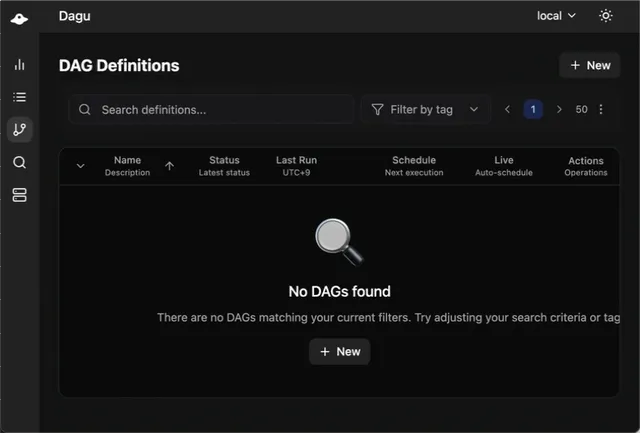
A batteries-included workflow engine that doesn't get in your way.
Define workflows in simple YAML, execute them anywhere with a single binary, compose complex pipelines from reusable sub-workflows, and distribute tasks across workers. Do all this without requiring databases, message brokers, or code changes to your existing scripts.
What is Dagu?
Dagu is a batteries-included workflow engine that doesn't get in your way. Define workflows in simple YAML, execute them anywhere with a single binary, compose complex pipelines from reusable sub-workflows, and distribute tasks across workers. Do all this without requiring databases, message brokers, or code changes to your existing scripts.
Built for developers who want powerful workflow orchestration without the operational overhead.
Web UI Preview

CLI Preview

Why Dagu?
🚀 Zero Dependencies
Single binary. No database, no message broker. Deploy anywhere in seconds, from your laptop to bare metal servers to Kubernetes. Everything is stored in plain files (XDG compliant), making it transparent, portable, and easy to backup. Learn more
🧩 Composable Nested Workflows
Build complex pipelines from reusable building blocks. Define sub-workflows that can be called with parameters, executed in parallel, and fully monitored in the UI. See execution traces for every nested level. No black boxes. Learn more
🌐 Language Agnostic
Use your existing scripts without modification. No need to wrap everything in Python decorators or rewrite logic. Dagu orchestrates shell commands, Docker containers, SSH commands, or HTTP calls. Use whatever you already have. Learn more
⚡ Distributed Execution
Built-in queue system with intelligent task routing. Route tasks to workers based on labels (GPU, region, compliance requirements). Automatic service registry and health monitoring included. No external coordination service needed. Learn more
🎯 Production Ready
Not a toy. Battle-tested error handling with exponential backoff retries, lifecycle hooks (onSuccess, onFailure, onExit), real-time log streaming, email notifications, Prometheus metrics, and OpenTelemetry tracing out of the box. Built-in user management with role-based access control (RBAC) for team environments. Learn more
🎨 Modern Web UI
Beautiful UI that actually helps you debug. Live log tailing, DAG visualization with Gantt charts, execution history with full lineage, and drill-down into nested sub-workflows. Dark mode included. Learn more
Quick Start
1. Install dagu
# Install to ~/.local/bin (default, no sudo required)
curl -L https://raw.githubusercontent.com/dagu-org/dagu/main/scripts/installer.sh | bash
# Install specific version
curl -L https://raw.githubusercontent.com/dagu-org/dagu/main/scripts/installer.sh | bash -s -- --version v1.17.0
# Install to custom directory
curl -L https://raw.githubusercontent.com/dagu-org/dagu/main/scripts/installer.sh | bash -s -- --install-dir /usr/local/bin# Install latest version to default location (%LOCALAPPDATA%\Programs\dagu)
irm https://raw.githubusercontent.com/dagu-org/dagu/main/scripts/installer.ps1 | iex
# Install specific version
& ([scriptblock]::Create((irm https://raw.githubusercontent.com/dagu-org/dagu/main/scripts/installer.ps1))) v1.24.0docker run --rm \
-v ~/.dagu:/var/lib/dagu \
-p 8080:8080 \
ghcr.io/dagu-org/dagu:latest \
dagu start-allbrew update && brew install dagunpm install -g --ignore-scripts=false @dagu-org/dagu2. Create your first workflow
Note: When you first start Dagu with an empty DAGs directory, it automatically creates example workflows to help you get started. To skip this, set
DAGU_SKIP_EXAMPLES=true.
cat > ./hello.yaml << 'EOF'
steps:
- echo "Hello from Dagu!"
- echo "Running step 2"
EOF3. Run the workflow
dagu start hello.yaml4. Start the Web UI
dagu start-allVisit http://localhost:8080
Key Features
Composable Nested Workflows
Break complex workflows into reusable, maintainable sub-workflows:
description: |
data-pipeline: Extract, transform, and load data daily with retries and parallelism.
schedule: "0 2 * * *" # Daily at 2 AM
type: graph
steps:
# Extract raw data
- name: extract
command: python extract.py --date=${DATE}
output: RAW_DATA
# Transform in parallel for each data type
- name: transform
call: transform-data
parallel:
items: [customers, orders, products, inventory]
params: "TYPE=${ITEM} INPUT=${RAW_DATA}"
depends: extract
# Load to warehouse with retry
- name: load
command: python load.py --batch=${RAW_DATA}
depends: transform
retryPolicy:
limit: 3
intervalSec: 10
backoff: true
---
# Reusable sub-workflow
name: transform-data
params: [TYPE, INPUT]
steps:
- name: validate
command: python validate.py --type=${TYPE} --input=${INPUT}
- name: transform
command: python transform.py --type=${TYPE} --input=${INPUT}
output: TRANSFORMED
- name: quality-check
command: python quality_check.py --data=${TRANSFORMED}Every sub-workflow run is tracked and visible in the UI with full execution lineage.
Distributed Execution with Worker Labels
Route tasks to specialized workers without managing infrastructure:
description: |
ML pipeline that preprocesses data on CPU workers and trains models on GPU workers.
workerSelector:
gpu: "true"
cuda: "11.8"
memory: "64G"
steps:
- name: preprocess
command: python preprocess.py
workerSelector:
cpu-only: "true" # Override for CPU task
- name: train
command: python train.py --gpu
# Uses parent workerSelector (GPU worker)
- name: evaluate
call: model-evaluation
params: "MODEL_PATH=/models/latest"Start workers with labels:
# GPU worker
dagu worker --worker.labels gpu=true,cuda=11.8,memory=64G
# CPU worker
dagu worker --worker.labels cpu-only=true,region=us-east-1Automatic service registry, health monitoring, and task redistribution included.
Advanced Error Handling
Production-grade retry policies and lifecycle hooks:
steps:
- name: api-call
executor:
type: http
config:
method: POST
url: https://api.example.com/process
timeout: 30s
retryPolicy:
limit: 5
intervalSec: 2
backoff: true # Exponential backoff
continueOn:
failure: true # Keep going even if this fails
handlerOn:
success:
command: slack-notify.sh "✅ Pipeline succeeded"
failure:
executor:
type: mail
config:
to: oncall@company.com
from: alerts@company.com
subject: "🚨 ALERT: Pipeline Failure - ${DAG_NAME}"
message: |
Pipeline failed.
Run ID: ${DAG_RUN_ID}
Check logs: ${DAG_RUN_LOG_FILE}
exit:
command: cleanup-temp-files.sh # Always runsBuiltin Executors
Execute task in different ways.
steps:
# Shell command
- name: local-script
command: ./deploy.sh
# Docker container
- name: data-processing
executor:
type: docker
config:
image: python:3.11
autoRemove: true
command: python process.py
# Remote SSH
- name: remote-deploy
executor:
type: ssh
config:
user: ubuntu
host: prod-server.internal
command: sudo systemctl restart app
# HTTP API call
- name: trigger-webhook
executor:
type: http
config:
method: POST
url: https://hooks.slack.com/services/xxx
# JSON processing
- name: parse-config
executor:
type: jq
config:
query: '.environments[] | select(.name=="prod")'
command: cat config.jsonUse Cases
🔄 Data Pipelines
Extract, transform, and load data with complex dependencies. Use nested workflows for reusable transformations and parallel processing.
🤖 ML Workflows
Train models on GPU workers, preprocess on CPU workers, and orchestrate the entire lifecycle with automatic retries and versioning.
🚀 Deployment Automation
Multi-environment deployments (dev → staging → prod) with approval gates, rollback support, and notification integrations.
📊 ETL/ELT
Replace brittle cron jobs with visible, maintainable workflows. Visualize data lineage and debug failures with live logs.
🔧 Legacy System Migration
Wrap existing shell scripts and Perl code in Dagu workflows without rewriting them. Add retry logic, monitoring, and scheduling incrementally.
☁️ Multi-Cloud Orchestration
Route tasks to workers in different cloud regions based on compliance requirements, data locality, or cost optimization.
